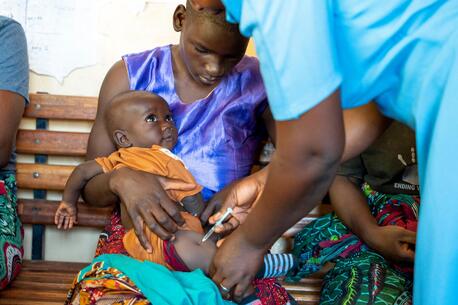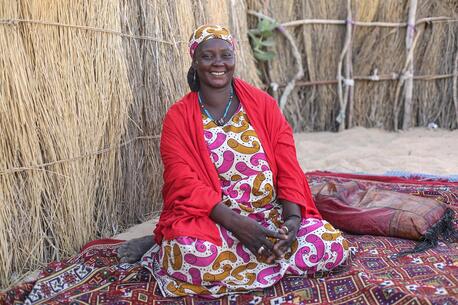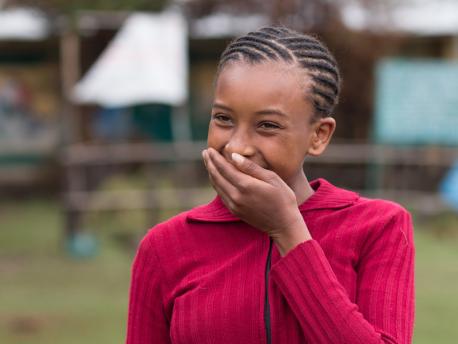
Fighting Menstruation Myths Keeps Girls in School
A bother, yes, and sometimes a pain — but periods don't have to be shameful, too.
Menstruation is a good thing: It's the female body doing an important job. Unfortunately, periods are also the subject of many persistent false notions. For example, there's the misconception that menstruation only begins after a girl has had sexual intercourse, or that a menstruating girl will cause harm to living things she touches. (It doesn't. She won't.)
Around the world, girls starting to menstruate have questions:
What is this? Why is it happening to my body? What do I do about it? How do I keep myself clean? Am I dying? Should I tell someone? Do I have to tell anyone? Did I do something bad? Will I have to get married? Am I dangerous? What if it shows? Why are they laughing at me?
I didn't have the answers. — a young girl in Sheno, Ethiopia
Every girl deserves accurate answers and resources. Periods are easier to manage when girls understand how their bodies work — and when the people around them are educated too.
Safe materials and practices prevent rashes and infections. Good menstrual hygiene allows more girls to go to school. Information opens doors — and minds — to women.
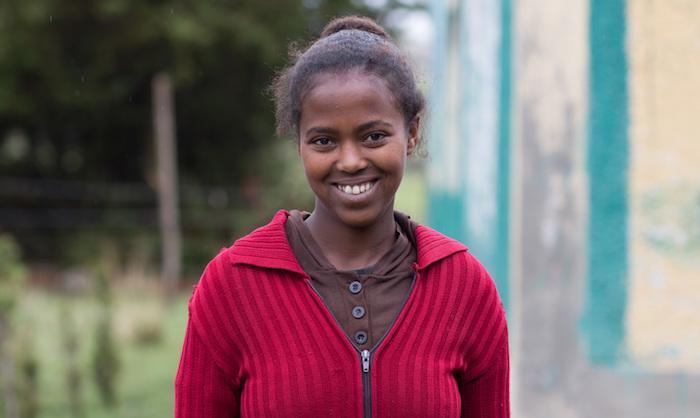
"I was fourteen when I first got my period. I cried a lot because I never heard about it. I was so scared to tell my family because I thought they would question me and I didn't have the answers to what happened," says Berhane, 16, in Sheno, Ethiopia. Berhane takes part in Girls’ Club, where boys and girls talk together about how their bodies work. © UNICEF/UN064407/Tadesse
Ignorance and shame about menstruation exist worldwide
Explicit taboos and more subtle forms of stigma lead to ostracism, mistreatment, early marriage, poverty and health problems, marginalizing and endangering the futures of girls and women.
Even in the most advanced countries, girls do not always have adequate education to prepare them for menstruation or the supplies they need. A survey in Scotland found that girls miss school during their periods and that some cannot afford to buy safe menstrual products.
In rural Nepal, menstruating girls are sometimes forced out of their homes and forbidden from contact with people, animals and even plants. The practice of sequestering girls in menstrual huts is harmful to them, and sometimes fatal.
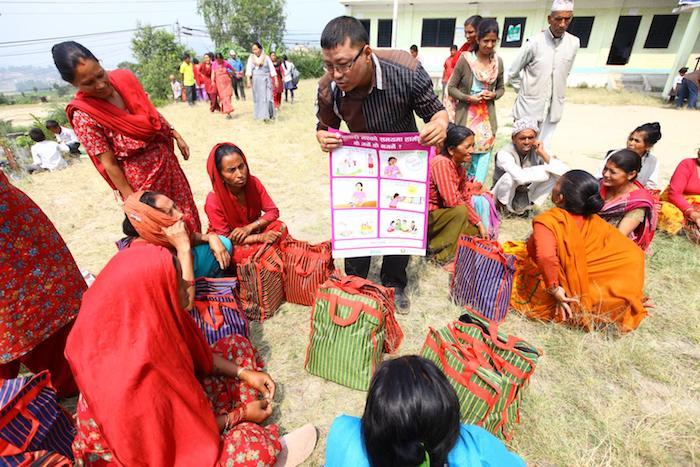
In Kavrepalanchok, Nepal, women who have received UNICEF hygiene kits listen as a UNICEF partner explains the importance of maintaining cleanliness during menstruation. © UNICEF/UNI187823/Panday
Women who are already vulnerable—for reasons like poverty, conflict or imprisonment — suffer further when they lack both materials and a means of disposal or washing.
Some girls resort to prostitution to pay for their menstrual supplies
A study in Kenya found that poor understanding and management of periods increases sexual exploitation and restricts the freedom of women and girls —results that influence each other.
Girls need money for menstrual hygiene supplies so that they can attend school. The Kenyan study shows that some girls resort to transactional sex in order to pay for their menstrual towels, risking possible pregnancy and HIV infection. When schools provide free menstrual supplies and education about puberty and sexuality, fewer girls prostitute themselves — and that saves money that would have been spent on future health care.
It was really scary to start bleeding from down there. I thought I was going to die. — a student in Uganda
In areas surrounding cities in Uganda, poverty and menstruation keep girls out of school. The reasons can be practical: “Sometimes when... mother has no money to buy material [sanitary pads] I don’t bother coming” [to school], one student said in an interview.
Sometimes anxiety keeps girls home. “I felt like, oh no... I didn’t want to stand up in class," one girl confessed. "My friends told me to go for lunch with them. I told them I didn’t want to because I was having my periods... I thought, like, I didn’t want anyone to come near me. I thought, like, they will get to know. Maybe I’m smelling.”
Solutions work best when girls and boys build knowledge together
In Cambodia, where pubescent girls suffer fear and distress, initiatives to improve menstrual health with education and facilities have led to increased attendance at school. A participating student says, "Now almost all girls come to school when they have their period.”
Now almost all girls come to school when they have their period. — a student in Cambodia
In girls’ clubs in Ethiopia, boys and girls talk together and learn about menstruation. Instead of teasing, boys learn to be proudly supportive of their female friends and siblings. The environment helps girls replace a sense of shame with an appreciation of their developing health and strength.
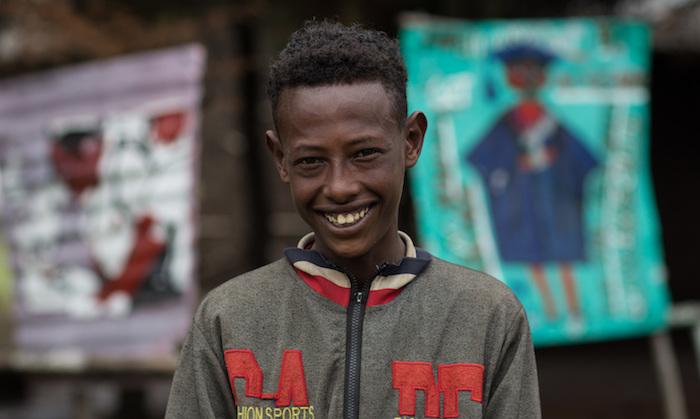
Alemayhu, 16, learned about menstruation after he joined the UNICEF-supported girls' club at his school in Sheno, Ethiopia, He shared what he learned about menstrual hygiene with three of his sisters. © UNICEF/UN064422/Tadesse
In Pakistan, young people use the free, confidential mobile-phone app U-Report to talk to one another openly about sensitive topics like menstruation. UNICEF WASH and U-Report in Pakistan launched the Menstrual Hygiene Innovation Challenge in June 2017.
During a 3-hour live chat, U-Reporters asked questions like "Can I take a bath during my period?" and "Why should girls not play sports during their periods?" Trained staffers provided detailed answers to the students' questions and found that young people in Pakistan are eager to take a lead in improving their communities, especially tackling challenges in areas such as health, hygiene and education.
Giving girls the tools and resources they need to help themselves
Having a menstrual period is not easy in a refugee camp. Among Rohingya refugees in Bangladesh, an innovative project is designed to help. Girls make menstrual pads for themselves and to sell at market, providing a resource to the community as they cultivate knowledge and skills.
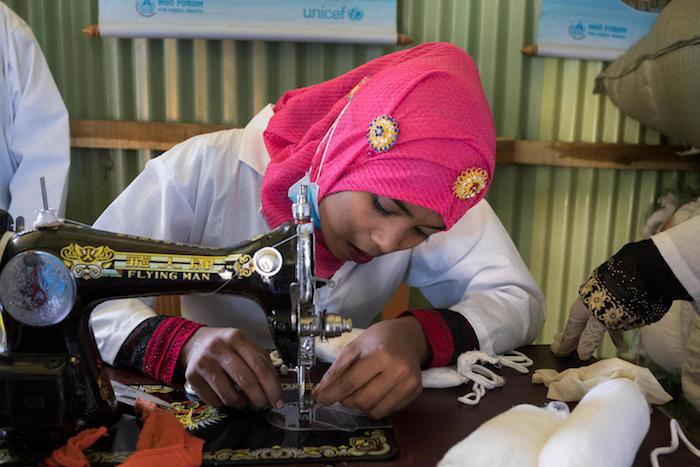
In Cox's Bazar, Bangladesh, Rohingya refugee girls in the UNICEF-supported Sanimart project make sanitary pads for themselves and to sell at the market. © UNICEF/UN0156997/Bindra
Making sure that girls everywhere possess a basic understanding of what menstruation is and isn’t, and providing menstrual products and water for washing in privacy, avoids health problems and reduces mistreatment and exploitation of girls and women. Good menstrual health management frees them to participate fully in daily life.
You can make an immediate difference for girls. For just $35, you can send a Girls Empowerment Pack with enough menstrual pads to give five girls the protection and peace of mind they need to stay in school.
Top photo: Serkalem, 14, at school in Sheno, Ethiopia, had learned about menstruation in Girls Club, so she felt prepared when her first period arrived. But she is still shy to mention the subject to her father. © UNICEF/UN064404/Tadesse
Are you interested in sponsoring a child? Learn how you can save and protect every child with UNICEF.

